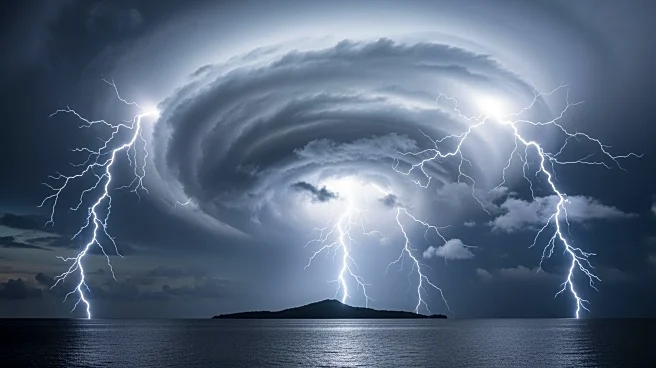What's Happening?
Hurricane Melissa, a catastrophic Category 5 storm, is set to make landfall in Jamaica, marking the strongest storm to hit the island since recordkeeping began 174 years ago. The hurricane is expected
to enter near St. Elizabeth parish in the south and exit around St. Ann parish in the north. Prime Minister Andrew Holness has warned of catastrophic damage, emphasizing the challenge of recovery speed. Landslides, fallen trees, and power outages have already been reported, with a life-threatening storm surge of up to 13 feet anticipated across southern Jamaica. Health Minister Christopher Tufton has relocated patients in coastal hospitals to higher floors as a precaution. The storm has already resulted in seven deaths across the Caribbean, including three in Jamaica.
Why It's Important?
The impact of Hurricane Melissa is significant for Jamaica, as it poses a severe threat to infrastructure, homes, and livelihoods. The storm's unprecedented strength highlights vulnerabilities in the region's disaster preparedness and infrastructure resilience. The potential for widespread damage and displacement could strain local resources and necessitate international aid. The hurricane's path through the Caribbean also affects neighboring countries like Haiti and the Dominican Republic, which are experiencing heavy rainfall and storm surges. The broader implications include potential disruptions to regional economies and long-term recovery challenges.
What's Next?
As Hurricane Melissa continues its trajectory, it is expected to make landfall in eastern Cuba, prompting evacuations of over 600,000 people. The storm is forecast to bring up to 20 inches of rain and significant coastal surges. Following Cuba, the hurricane is projected to turn northeast and impact the southeast Bahamas by Wednesday evening. Authorities in affected regions are on high alert, with hurricane warnings in effect and preparations underway to mitigate damage and ensure public safety.
Beyond the Headlines
The arrival of Hurricane Melissa underscores the increasing frequency and intensity of extreme weather events, potentially linked to climate change. This raises questions about the adequacy of current infrastructure and disaster response strategies in the Caribbean. The storm's impact may prompt discussions on climate resilience and the need for sustainable development practices to better withstand future natural disasters.










